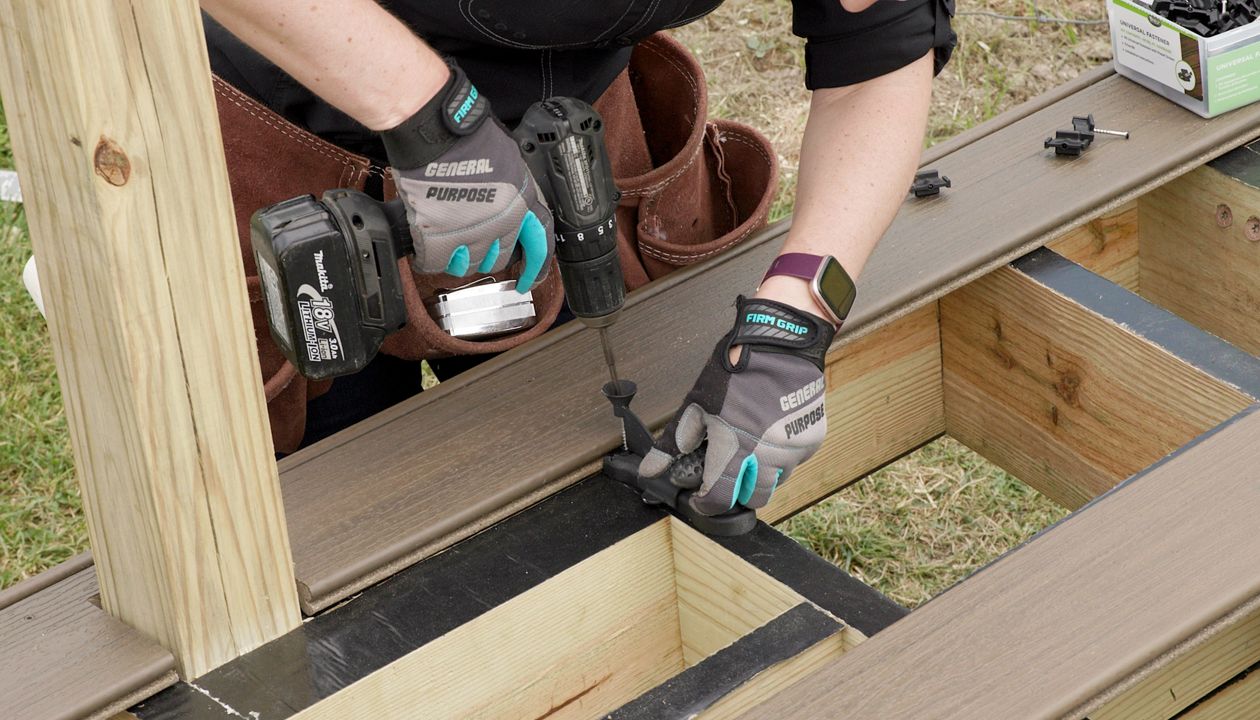Exactly how to Pick the Right Materials for Your Deck Installation Job
Selecting the suitable materials for your deck setup job can seem difficult. There are many variables to consider, from resilience and maintenance to aesthetics and environmental impact. The choice between typical wood and composite materials, each with its own collection of benefits and downsides, can be specifically challenging. The key is to stabilize your spending plan, layout choices, and way of life needs to create a deck that will boost your exterior room for several years to find.
Comprehending the Various Sorts Of Deck Materials
When beginning on a deck setup job, the choice of materials ends up being a critical decision. Compound materials, on the other hand, are a blend of timber and plastic, giving sturdiness and resistance to weather components. By understanding these differences, house owners can make an extra enlightened choice on the most suitable deck product for their specific needs.
Evaluating the Longevity and Maintenance Requirements of Deck Products
Assessing the resilience and upkeep requirements of deck materials is an essential step in deck installation. Longevity includes the product's capability to stand up to harsh weather condition problems, wear and tear, and its longevity.
Comprehending upkeep requirements is just as essential. Some products require normal sealing or discoloring to keep their appearance and stand up to wetness damage, while others, like composite outdoor decking, require less maintenance. By examining these elements, one can choose one of the most suitable outdoor decking product, making sure a balance in between toughness, upkeep requirements, and visual charm.
Cost Analysis: Comparing Timber and Compound Decking
Although expense may initially seem like a second worry, it is a significant variable when comparing wood and composite decking. On the various other hand, composite decking, while costlier initially, requires much less maintenance, possibly minimizing long-term expenses. Possible deck owners have to consider their budget and readiness to preserve their decks when choosing in between wood and composite outdoor decking.
Looks and Design Adaptability of Decking Products
Natural wood outdoor decking supplies a traditional, timeless look, while composite materials supply a large range of shades and structures to fit diverse preferences and designs. Composite materials, while much less versatile in design, are still versatile enough for many deck designs. These variables, as a result, are crucial factors in the option of decking product.
Environmental Influence of Decking Materials
When picking outdoor decking materials, one have to think about not just appearances and longevity, however also the environmental influence. It's crucial to assess the sustainability of products and explore recycled outdoor decking alternatives. Moreover, understanding the prospective impact on regional ecosystems will make certain an extra ecologically responsible choice.
Examining Product Sustainability
In the realm of deck building and construction, analyzing product sustainability is a crucial action. Composite decking products frequently incorporate timber and plastic, minimizing the demand for brand-new timber yet boosting reliance on fossil gas - deck installation austin. Therefore, the choice of outdoor decking materials should balance capability, aesthetic appeals, price, and sustainability to guarantee an accountable and long-lasting setup.
Recycled Outdoor Decking Options

Composite decking is especially prominent because of its durability and ease of maintenance. It's immune to rot, pests, and fading, making it a long-lasting option. Recycled plastic outdoor decking, on the various other hand, is highly resilient and requires very little upkeep. While these products may lug a greater initial cost, their durability and decreased ecological impact make them a smart investment for the eco-conscious home owner.

Influence On Local Ecological Communities
While the advantages of utilizing recycled materials for outdoor decking can not be overstated, it's just as vital to think about the more comprehensive environmental ramifications of these selections. The extraction, processing, and transportation of products can profoundly affect neighborhood ecosystems. Deforestation for lumber outdoor decking adds to environment loss and environment change. Even the manufacturing of composite products can launch dangerous emissions. On the other hand, using recycled or sustainably sourced products can help reduce these impacts. Considering view it now the lifespan of materials can minimize ecological effect; longer-lasting alternatives call for less frequent replacement, thus conserving sources. Correct disposal of old outdoor decking is crucial to lessening land fill waste. Essentially, an eco-conscious deck job demands careful product choice, lasting sourcing, and responsible disposal.
Making Your Final Choice: Tips for Choosing the Finest Deck Materials
As the article changes into the subtopic of "Making Your YOURURL.com Last Decision: Tips for Selecting the very best Deck Products", it is important to understand the selection of deck materials readily available. Striking a balance between durability and appearance is necessary in this choice procedure. The complying with discussion will certainly direct readers in making an educated choice based upon these essential considerations.
Comprehending Different Deck Materials
The job of choosing the appropriate products for your deck installation can appear daunting due to the vast variety of choices offered. Plastic or PVC decks are even extra sturdy and need less upkeep than composite products, however they can look less all-natural. Aluminum decks are solid, lightweight, and immune to rot, but they are likewise the most costly option.
Resilience vs. Visual Appeals Balance
Stabilizing toughness with aesthetics can be an obstacle when picking deck materials. The decision commonly steams down to individual preferences and the deck's meant use. High-traffic locations might demand long lasting materials like composite outdoor decking, which stands up to deterioration but might lack the all-natural beauty of wood. On the other hand, wood supplies an ageless appeal and heat that artificial materials battle to replicate. It needs more maintenance and might not last as long. Therefore, home owners need to strike an equilibrium, thinking about both the deck's sensible needs and their visual preferences. By doing so, they can guarantee their deck remains a useful and attractive outside space for many years to come.
Conclusion
To conclude, selecting the ideal materials for your deck installation project calls for careful consideration of factors such as resilience, maintenance, expense, visual appeals, and ecological influence. Whether you choose typical timber or composite materials, your choice should line up with your budget plan, style preferences, and way of living. Inevitably, the finest decking product is one that boosts your outside area and provides satisfaction for several years to find.